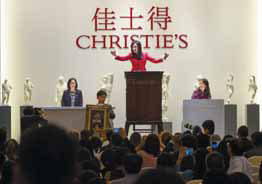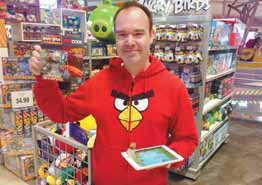A cultural opportunity
Updated: 2013-11-07 06:54
By Shi Jing and Zhang Kun (China Daily)
|
|||||||||||
Shanghai's pilot free trade zone is being eyed by global arts companies as an entry point into the lucrative Chinese market. Shi Jing and Zhang Kun report in Shanghai.
The opportunities presented by the China Pilot Free Trade Zone in Shanghai are not only much anticipated by financial sectors and the like, but also the cultural sector, with the initiative opening doors to foreign companies.
According to detailed regulations announced by the Ministry of Culture, the FTZ will allow overseas performance agents to operate as part of joint ventures, companies in cooperation with Chinese partners or wholly foreign-owned enterprises to work out of the zone.
The biggest move forward is allowing wholly foreign-owned enterprises to operate in the FTZ, explains Yang Ruixian, deputy director of the marketing department of Shanghai Municipal Administration of Culture, Radio, Film and TV.
So far, not many foreign companies in the culture industry have set up branches in the FTZ. But Ren Yibiao, managing director of Shanghai Oriental Huiwen International Cultural Service Trading Co Ltd, operator of National Base for International Cultural Trade in the FTZ, says they have received more than 300 inquires from companies in the cultural industry about setting up branches.
More than 20 culture-related companies have been registered in the FTZ, including well-known names such as Huayi Brothers Media Group, Christie's, China National Publications Import & Export (Group) Corporation, Shanghai Oriental Pearl (Group) Co Ltd and Shanda Interactive Entertainment Ltd.
The establishment of the FTZ will also facilitate trade between China and other countries and regions in the world. The arrival of world-renowned fine arts auction house Christie's is the best example. The National Base for International Cultural Trade in the FTZ was responsible for all the services for Christie's first auction in Shanghai this fall. By storing all the art pieces in the FTZ, it saved up to 24 percent in taxes, says Hu Huanzhong, executive vice-general manager of Huiwen.
Before the establishment of the FTZ, Huiwen successfully assisted such cultural trade. The Shanghai Ballet's Jane Eyre staged at the London Coliseum in August, was one of Huiwen's achievements.
Shanghai Ballet rented the venue itself, outsourced advertising, marketing and ticket sales and split the share of box-office income between themselves, local partners in the United Kingdom and Huiwen.
Difficulties arose, including how to deal with the international balance of payment, settlement and compliance design of the contract, which was signed with cooperative partners overseas. If these problems could not have been solved, it would have been costly.
Huiwen helped with the signing of a cooperative agreement; negotiated with relevant administrative departments; identified obligations of the three parties; classified various fees and expenditure particulars; and, more importantly, determined the tax rate of international settlement of the particulars according to the terms set by China and Britain to avoid double taxation.
Of course, the establishment of the FTZ brings hope to other companies.
United Asia Live Entertainment was registered in the Waigaoqiao free trade zone (now part of the FTZ) three years ago when it was founded. It's a joint venture of China Arts and Entertainment Group, Shanghai Media Group and CJ E&M in the Republic of Korea.
It produced Chinese editions of Broadway musicals Mamma Mia! and Cats, and just launched its original Chinese musical productions The Feast of the Princess and Finding Destiny.
Tian Yuan, general manager of UAE, is excited by the possibilities presented by the new FTZ.
Despite the fact that UAE was registered in the Waigaoqiao FTZ, they encountered difficulties with foreign investment.
"Investment from our shareholder in the ROK, CJ E&M, can only go to the 'registered capital'," Tian says. "We hope our foreign partners will be able to invest in specific projects, and be able to retrieve the profit out of China.
"We have some nice visions for the new free trade zone, but so far all of it is just good will."
With more opportunities open to foreign companies, domestic businesses are worried about potential competition. But Molly Cheng, an individual performance agent based in Shanghai, says the arrival of foreign entertainment agencies will not pose much of a challenge to local agents.
Overseas entertainment agent companies are no longer new to China. But Cheng says overseas agencies have not done as well as expected because of an inadequate understanding of the local market and not enough attention devoted to the exploitation of the market.
"It does not matter much if the entertainment agency is based in China or overseas nowadays. If we would like to invite overseas stars or actors to come over for performances, the application procedure is not that complicated," she says.
In terms of the possibility of Chinese actors and singers signing contracts with foreign companies based in the FTZ, Cheng says it would not be the wisest move for the artists.
"Even though the singer or the actor is known in almost every household in China, the overseas agency will not take him or her seriously," she says.
The biggest change will be the convenience rendered in terms of overseas actors giving performances in China and vice versa, bridging the gaps between different cultures, Cheng says.
The sector that has really opened to foreign investment, according to the Ministry of Culture, is gaming devices. This may signal that gaming devices, such as Microsoft's XBOX and Nintendo, which have been banned in China for about a decade, will soon be given a green light.
Receiving registration number 001 in the FTZ is the joint venture between Microsoft and BesTV that produces online games.
Ralph Haupter, chairman and CEO of Microsoft Greater China, says the company is excited about the opportunity that the FTZ provides for the joint venture, saying it is "happy to see opportunities for innovation based on financial services and the service industry".
Haupter says the FTZ will bring a lot of changes to the mobile-games market, creating opportunities in the Chinese market for both foreign and domestic developers.
"We are also expecting many international companies to come to China and localize their solutions and products for the Chinese market," he says.
Peter Vesterbacka, chief marketing officer of Rovio, the Finland-based game studio known for its multimillion-selling game Angry Birds, says the FTZ is "a very good step in the right direction".
Rovio is still studying the detailed regulations in the FTZ. But the company hopes to establish a strong presence in the Chinese market and wants to have the same opportunities as Chinese companies.
Selcuk Ergin, a board member of the Turkey Game Association, is working on a report for the Economic Ministry of Turkey in regards to the Turkish gaming sector. He says the policies in the FTZ could also benefit other technology enterprises.
"I am also looking for small software companies with small investments opportunities," he says.
He says he hopes a fair go is given to overseas companies in the FTZ, which he says will be mutually beneficial to the Chinese businesses.
Contact the writers at shijing@chinadaily.com.cn and zhangkun@chinadaily.com.cn.
|
The establishment of the China Pilot Free Trade Zone will bring more Chinese productions like the Shanghai Ballet's Jane Eyre to the world stage. Jin Yi / for China Daily |
|
Christie's first auction in Shanghai this fall is an example of how the free trade zone facilitates trade between China and other countries. Gao Erqiang / China Daily |
|
Peter Vesterbacka, chief marketing officer of Rovio, the Finland-based game studio known for its game Angry Birds, says the free trade zone is "a very good step in the right direction". Provided to China Daily |
(China Daily 11/07/2013 page22)
Today's Top News
China's east still the top draw for foreigners
Huawei has eye on 5G
Li: China to modernize farms
Plenum chance for urbanization
Bigger role sought in cybersecurity
EU strives for banking union amid opposition
PE, VC investors see big returns in M&As
China reforms eye more innovative bases
Hot Topics
Lunar probe , China growth forecasts, Emission rules get tougher, China seen through 'colored lens', International board,
Editor's Picks

|

|

|

|

|

|








